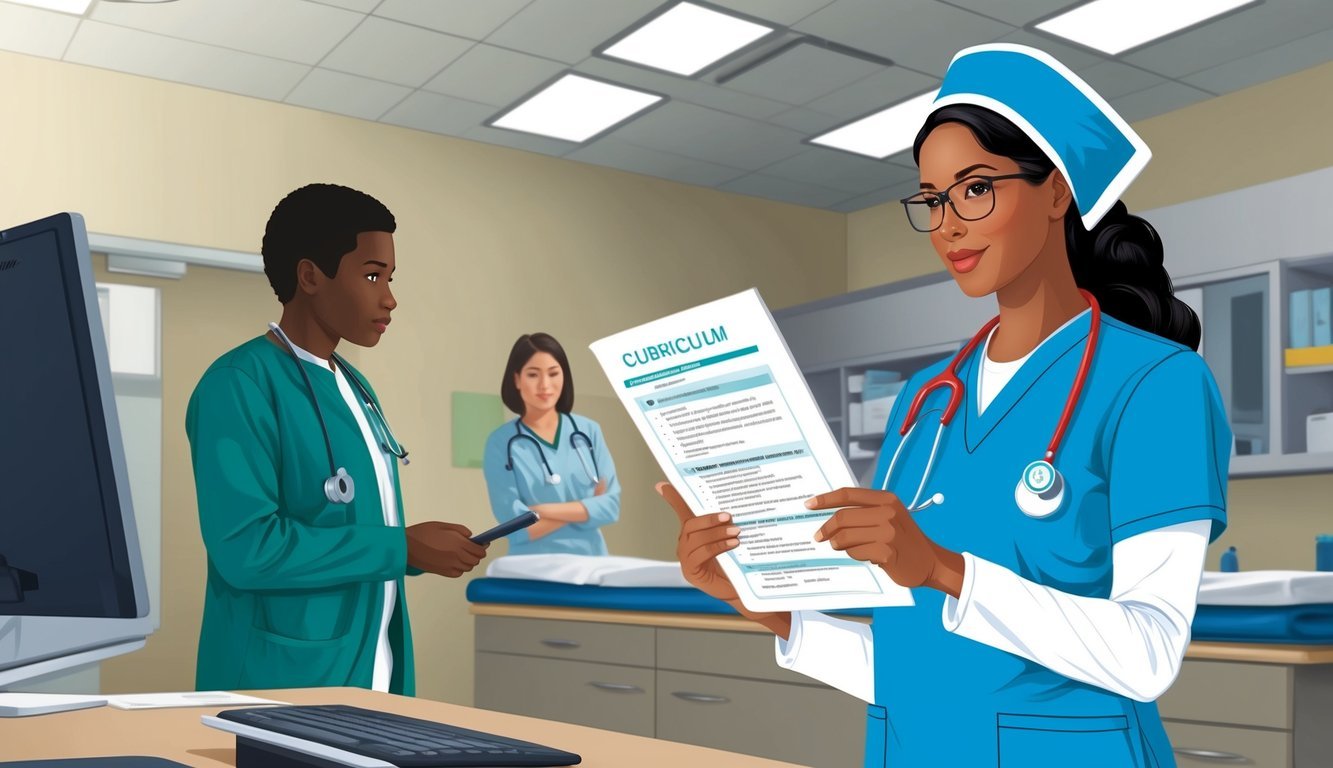If you hold a bachelor’s degree in a field outside of nursing and wish to transition into healthcare, pursuing nursing as a second degree could be an excellent choice. Accelerated nursing programs are specifically designed for individuals like you, allowing you to earn your Bachelor of Science in Nursing (BSN) in a much shorter timeframe—typically 9 to 18 months. This pathway not only paves the way for a rewarding career but also addresses the growing demand for qualified nurses.
The appeal of second-degree nursing programs lies in their efficiency and structured curriculum.
By leveraging your existing educational background, these programs focus on essential nursing skills and knowledge, preparing you for the challenges of the profession.
Many institutions offer various options, from fully online courses to hybrid models, making it easier to find a program that fits your lifestyle and commitments.
You can explore detailed information about specific programs, entrance requirements, and costs by visiting resources such as Nurse.org and Nurse Journal.
Transitioning into nursing can also open doors to various specializations and career opportunities, allowing you to impact patient lives significantly.
Whether you aspire to work in hospitals, clinics, or community health settings, the skills you gain will be invaluable.
With a strong commitment and the right program, you can become part of this essential field and start making a difference in healthcare.
Understanding Nursing as a Second Degree
Transitioning into nursing from a different field is a viable option for many individuals.
Second-degree nursing programs offer a structured path for those who already hold a bachelor’s degree in another discipline to enter the nursing profession.
Defining Second-Degree Nursing Programs
Second-degree nursing programs are designed specifically for individuals who have completed a bachelor’s degree in a non-nursing field.
These programs typically allow you to earn a Bachelor of Science in Nursing (BSN) in a shorter time frame, usually around 12 to 18 months.
Key features of these programs include:
- Accelerated Format: Courses are often condensed into a more intense schedule, allowing for faster completion.
- Clinical Experience: These programs incorporate hands-on clinical training, essential for practical nursing skills.
- Prerequisite Knowledge: You may need to complete specific science and nursing prerequisites before enrollment.
By opting for a second-degree nursing program, you can seamlessly shift into a rewarding career as a registered nurse.
Paths to Becoming a Registered Nurse
To become a registered nurse (RN) through a second-degree program, several pathways exist.
Most second-degree programs provide an accelerated nursing track that includes the following aspects:
- Application Process: You will generally need to submit transcripts, a statement of purpose, and letters of recommendation.
- Curriculum: The curriculum includes both nursing theory and practice, covering essential topics such as pharmacology, nursing ethics, and patient care techniques.
- Licensure Exam: After completion, you must pass the NCLEX-RN exam to obtain your nursing license.
Various institutions offer these programs, and costs can range widely depending on factors like public or private status.
Researching options, such as the Accelerated Bachelor of Science in Nursing (ABSN) program, can help you find the right fit for your career goals.
Types of Nursing Programs and Education
Choosing the right nursing program is crucial for your career transition.
You have several options that cater to your previous education and career path.
Each program type offers unique benefits and requirements to help you advance in nursing.
Accelerated BSN Programs
Accelerated Bachelor of Science in Nursing (ABSN) programs are designed for individuals who already hold a bachelor’s degree in another field.
These programs offer a condensed curriculum focusing on nursing coursework and clinical experiences, allowing you to earn your BSN degree in as little as 12 to 24 months.
Key features of ABSN programs include:
- Intensive Coursework: The curriculum covers essential nursing topics quickly.
- Clinical Experience: You gain hands-on experience in a variety of healthcare settings.
- Flexible Formats: Many ABSN programs offer part-time options or online components to accommodate your schedule.
Because of the rigorous nature of the program, you need strong time management and study skills.
This pathway is suitable for those eager to transition into nursing swiftly.
Traditional BSN Programs
Traditional Bachelor of Science in Nursing (BSN) programs typically span four years and are ideal for individuals seeking a comprehensive nursing education.
These programs are available at many universities and provide a thorough grounding in both nursing science and practical skills.
The traditional BSN program includes:
- Foundational Courses: You will take courses in biology, psychology, and health sciences.
- Nursing Theory and Practice: The curriculum integrates nursing theory with clinical practice.
- Licensure Preparation: Successful completion prepares you to take the NCLEX-RN exam for licensure.
This route is advantageous if you prefer a more extensive educational experience and want to deeply engage with the nursing field.
Online RN-to-BSN Programs
Online RN-to-BSN programs cater to registered nurses (RNs) who already possess an associate degree or diploma in nursing.
These programs provide a flexible and convenient way for you to earn your BSN while balancing work and other commitments.
Key aspects of online RN-to-BSN programs include:
- Flexible Learning: Courses are typically offered asynchronously, allowing you to study on your schedule.
- Advanced Coursework: You will explore advanced nursing topics, leadership, and healthcare management.
- Bridge to Leadership Roles: Completing a BSN can lead to better job prospects and advancement opportunities.
Admission Requirements and Considerations

When pursuing nursing as a second degree, understanding specific admission requirements is crucial.
This includes having the necessary prerequisite coursework, preparing for required exams, and considering the financial implications of your education.
Prerequisite Coursework
Before entering a second-degree nursing program, you must complete certain prerequisite courses.
Commonly required courses include:
- Anatomy and Physiology
- Microbiology
- Chemistry
- Psychology
Many programs expect a minimum GPA of 2.5 to 3.5 on your prerequisite courses.
You should confirm specific GPA requirements with the schools you are interested in, such as the University of Rochester.
Completing these courses not only fulfills admission requirements but also prepares you for advanced nursing topics.
Exams for Admission
Most nursing programs require applicants to take specific entrance exams, which may include the ATI, HESI, or TEAS.
These exams assess your academic readiness for nursing school, covering areas such as:
- Reading Comprehension
- Mathematics
- Science
Scores vary by program, so check each school’s requirements for minimum scores.
Preparing adequately for these exams will strengthen your application and enhance your chances of acceptance.
Some programs may also require passing the NCLEX-RN exam for licensure upon graduation.
Financial Considerations for Prospective Students
Understanding the financial aspects of nursing school is essential.
Tuition costs for second-degree nursing programs can range significantly.
Here’s a general breakdown:
| Type of Institution | Estimated Tuition |
|---|---|
| State Technical Schools | As low as $13,000 |
| Top-Tier Universities | Over $100,000 |
Look into financial aid options such as scholarships, grants, and loans.
Many schools offer financial advising services that can help you navigate funding your education.
It is also advisable to start planning early to ensure you can meet your financial commitments while focusing on your studies.
Curriculum and Clinical Experience

In a second-degree nursing program, the curriculum and clinical experiences are structured to provide you with essential knowledge and practical skills.
These programs prepare you for various nursing roles through targeted coursework and significant clinical hours.
Core Nursing Courses and Specialties
Your nursing curriculum will typically include foundational courses such as anatomy and physiology, microbiology, and human growth and development.
These courses are crucial for understanding the complexities of patient care.
Beyond foundational knowledge, you will engage in specialized nursing topics.
Common specialties include:
- Medical-Surgical Nursing (Med-Surg): Provides skills for managing diverse patient populations.
- Pediatrics: Focuses on nursing care for infants and children.
- Obstetrics: Covers care for pregnant women and newborns.
You will also learn about evidence-based practice and health policy, which are vital for delivering high-quality care and understanding the healthcare system.
Clinical Rotations and Hands-On Training
Clinical placements are a significant component of your training, often requiring hundreds of clinical hours.
These rotations occur in various settings, such as hospitals, clinics, and community health centers.
During clinical assignments, you will apply classroom knowledge in real-world scenarios, which includes:
- Working under the supervision of experienced nurses and nursing faculty.
- Gaining hands-on experience with direct patient care.
- Developing leadership skills essential in nursing roles.
This practical exposure not only solidifies your nursing skills but also prepares you to navigate complex healthcare environments.
Engaging in diverse rotations will foster your adaptability as a future nurse.
Career Advancement and Professional Opportunities
Embarking on nursing as a second career opens various pathways for professional growth and specialized opportunities.
By transitioning into this rewarding field, you can access diverse roles in healthcare systems and beyond.
Transitioning into a Nursing Career
Transitioning to a nursing career allows you to leverage your previous professional experience while gaining new skills.
Many individuals find nursing to be a fulfilling career change, offering both personal satisfaction and job stability.
Key Points:
- Job Demand: Registered nurses (RNs) are in high demand across numerous healthcare settings, ensuring you have steady employment opportunities.
- Pathways to Practice: Consider qualifications such as a Bachelor of Science in Nursing (BSN) or an accelerated program, which may expedite your entry into the profession.
Helpful resources like NurseJournal provide insights into this transition.
Higher Education and Specialized Nursing Fields
Higher education marks a significant step in advancing your nursing career.
Pursuing advanced degrees like a Master’s in Nursing or certification as a Nurse Practitioner (NP) positions you for specialized roles.
Specialty Areas Include:
- Nurse Practitioners (NPs): These advanced practice registered nurses provide primary and specialty care, often focusing on specific patient populations.
- Leadership Roles: Higher education allows for opportunities in nursing leadership, influencing policy and practice within healthcare systems.
Specializations can vary widely, covering areas such as pediatrics, geriatrics, and mental health.
Explore options through programs like the ANA Enterprise to find your niche in the nursing profession.
Accreditation and Program Outcomes
Accreditation is a crucial factor that can influence your educational journey in nursing.
It ensures that the program meets specific standards of quality and prepares you adequately for your career.
Understanding program outcomes is also essential, as these outcomes indicate how well graduates perform in the nursing field.
Evaluating Accreditation Status
When assessing a nursing program, check if the Commission on Collegiate Nursing Education (CCNE) accredits it.
CCNE-accredited programs adhere to rigorous standards that guarantee educational quality.
You might find it beneficial to look for programs that meet the requirements for BSN degrees.
These programs typically have a duration ranging from 12 to 24 months for those who already hold a bachelor’s degree in a non-nursing field.
Accreditation not only enhances the credibility of your nursing degree but also affects your eligibility for financial aid and employment opportunities.
| Accreditation Status | Program Length | Tuition Costs |
|---|---|---|
| CCNE Accredited | 12-24 months | Varies by program |
| Not CCNE Accredited | Longer duration | Higher tuition |
Graduation and Beyond
Graduation from an accredited program often leads to better employment outcomes.
Many graduates secure RN positions soon after completing their degree.
Programs typically report high statistical outcomes.
The employment rate for graduates from CCNE-accredited programs usually surpasses 90%.
This is significant, as it reflects both job stability and the value of your education.
Many schools provide flexible payment plans and financial aid resources tailored for the RN adult learner.
This can make your transition into nursing more manageable.
Attending an accredited program can position you for success in your nursing career.
It ensures you possess both the credentials and skills needed to excel.

